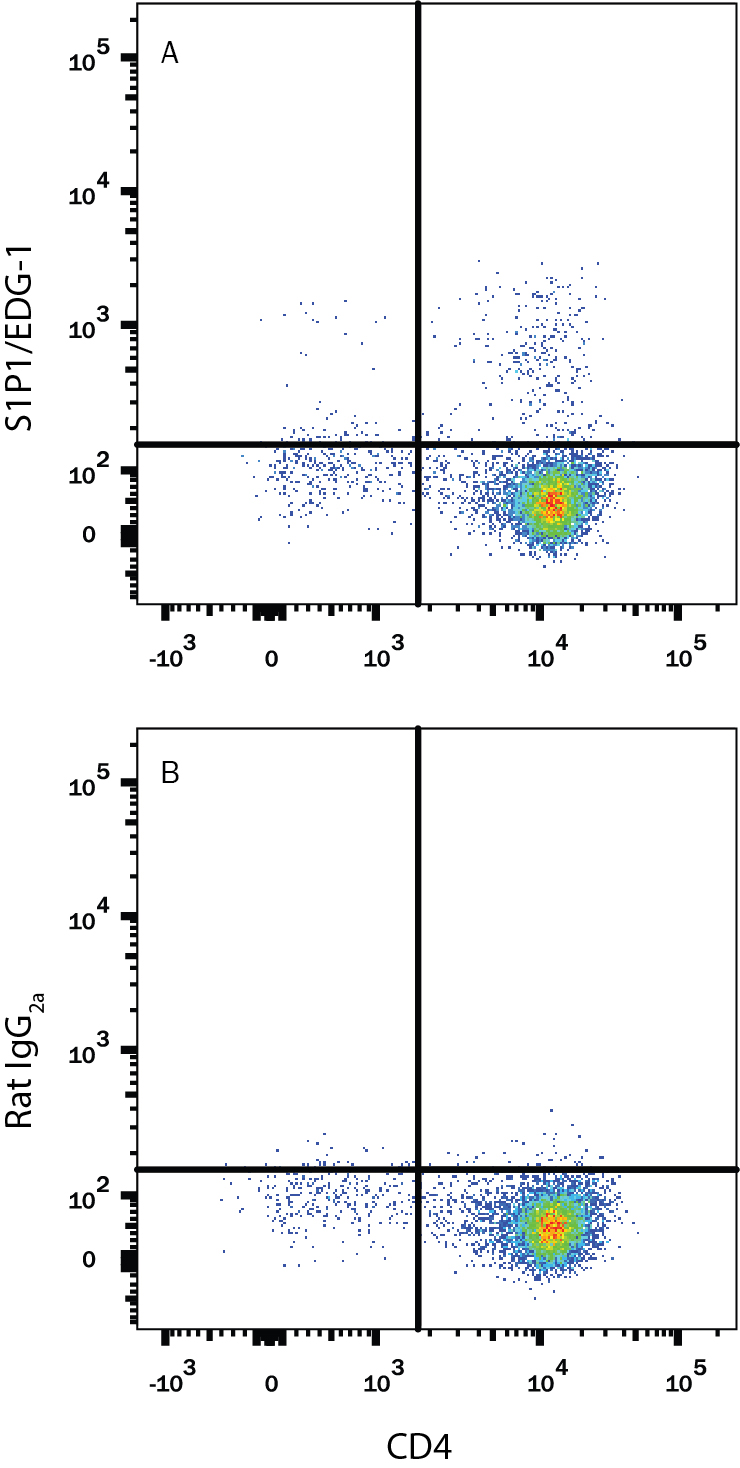Mouse S1P1/EDG-1 Alexa Fluor® 488-conjugated Antibody Summary
Accession # O08530
Applications
Please Note: Optimal dilutions should be determined by each laboratory for each application. General Protocols are available in the Technical Information section on our website.
Scientific Data
 View Larger
View Larger
Detection of S1P1/EDG-1 in Mouse Thymocytes by Flow Cytometry. Mouse thymocytes were stained with Rat Anti-Mouse CD4 APC-conjugated Monoclonal Antibody (Catalog # FAB554A) and either (A) Rat Anti-Mouse S1P1/EDG-1 Alexa Fluor® 488-conjugated Monoclonal Antibody (Catalog # FAB7089G) or (B) Rat IgG2A Alexa Fluor 488 Isotype Control (Catalog # IC006G). View our protocol for Staining Membrane-associated Proteins.
Reconstitution Calculator
Preparation and Storage
- 12 months from date of receipt, 2 to 8 °C as supplied.
Background: S1P1/EDG-1
S1P1 (sphingosine 1-phosphate receptor-1), also known as EDG-1 (endothelial differentiation, G-protein coupled receptor-1) or S1PR1 (sphingosine-1-phosphate receptor 1) is a widely expressed, 37-40 kDa, G protein coupled receptor within the S1P subfamily of the EDG family. S1P1 is one of five receptors for the bioactive lipid S1P and mediates most of S1P effects on angiogenesis, vascular maturation, and cell migration, especially T cell egress from lymphoid organs. Human and mouse S1P1 share 84% amino acid identity within the N-terminal extracellular portion used as an immunogen.
Product Datasheets
Product Specific Notices
This product is provided under an agreement between Life Technologies Corporation and R&D Systems, Inc, and the manufacture, use, sale or import of this product is subject to one or more US patents and corresponding non-US equivalents, owned by Life Technologies Corporation and its affiliates. The purchase of this product conveys to the buyer the non-transferable right to use the purchased amount of the product and components of the product only in research conducted by the buyer (whether the buyer is an academic or for-profit entity). The sale of this product is expressly conditioned on the buyer not using the product or its components (1) in manufacturing; (2) to provide a service, information, or data to an unaffiliated third party for payment; (3) for therapeutic, diagnostic or prophylactic purposes; (4) to resell, sell, or otherwise transfer this product or its components to any third party, or for any other commercial purpose. Life Technologies Corporation will not assert a claim against the buyer of the infringement of the above patents based on the manufacture, use or sale of a commercial product developed in research by the buyer in which this product or its components was employed, provided that neither this product nor any of its components was used in the manufacture of such product. For information on purchasing a license to this product for purposes other than research, contact Life Technologies Corporation, Cell Analysis Business Unit, Business Development, 29851 Willow Creek Road, Eugene, OR 97402, Tel: (541) 465-8300. Fax: (541) 335-0354.
FAQs
-
Can staining with Mouse S1P1/EDG-1 conjugated Antibody, catalog # FAB7089*, be carried out at 4°C?
There is evidence that G protein family proteins require staining at room temperature (RT) or even 37 °C, so this is what we would recommend. Staining for 45 minutes is optimal with this antibody.
Reviews for Mouse S1P1/EDG-1 Alexa Fluor® 488-conjugated Antibody
Average Rating: 3 (Based on 1 Review)
Have you used Mouse S1P1/EDG-1 Alexa Fluor® 488-conjugated Antibody?
Submit a review and receive an Amazon gift card.
$25/€18/£15/$25CAN/¥75 Yuan/¥2500 Yen for a review with an image
$10/€7/£6/$10 CAD/¥70 Yuan/¥1110 Yen for a review without an image
Filter by:
When used at a 1:10 dilution this antibody can reliably be used to detected expression of S1P1 on peripheral blood lymphocytes. When I tired to used this antibody at a lower concentration (higher dilution) I was not able to detect staining. Thus, a large amount of antibody is needed to stain each sample.


